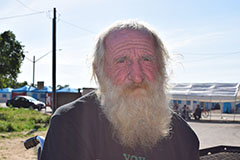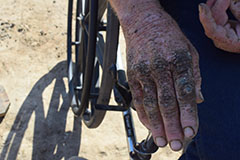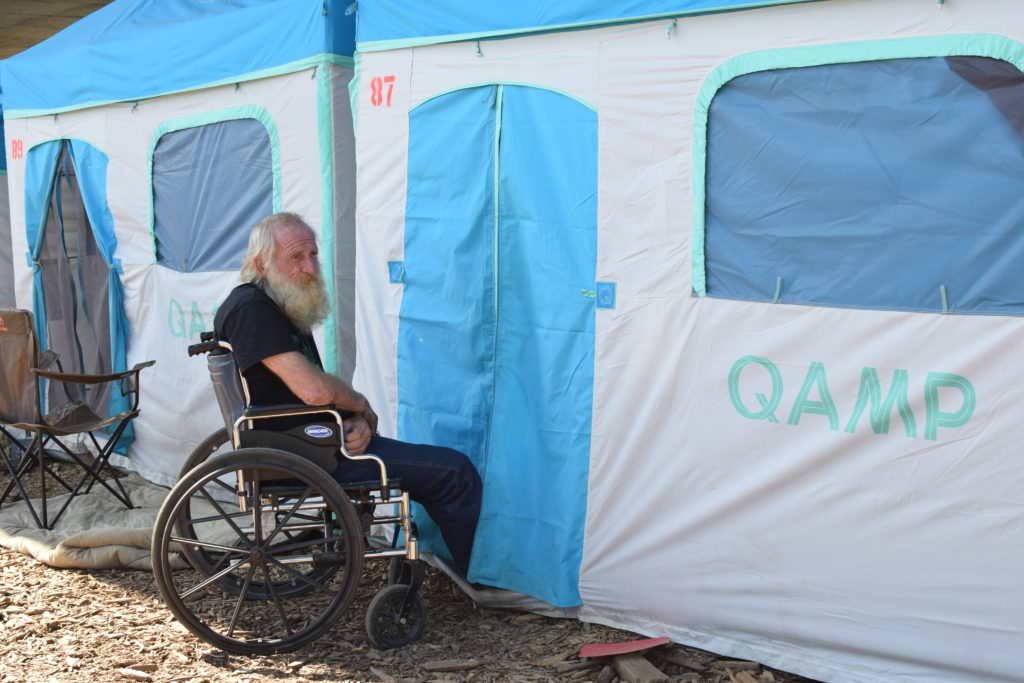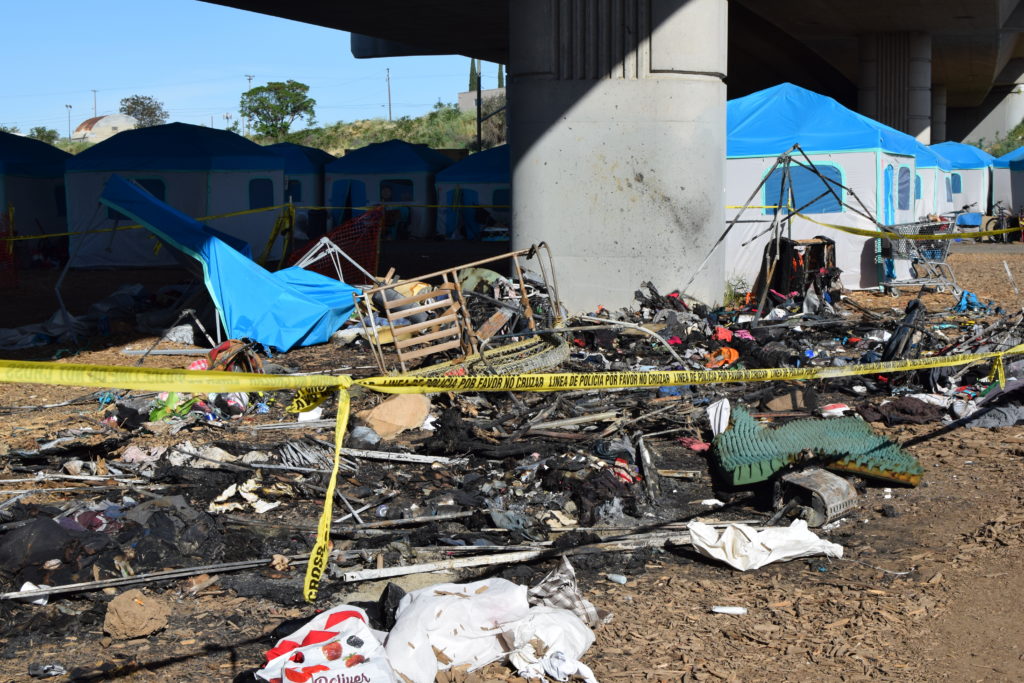
Kenneth “Pops” Yarber became homeless in 1995, not long after a brain aneurysm put him in a wheelchair. Suddenly, he was forty years old and on disability.
Not long afterward, the bank foreclosed on his house on 4th Street in Modesto, and he began bouncing from the streets to short stays with friends and relatives. A few years later, Pops was convicted of passing bad checks and using stolen credit cards. He spent a couple of years in prison.
“I was just trying to survive,” he said recently. “After I got out I failed to report to parole and they took away my Social Security.”
When he was able to work, Pops installed telephone and television cables. On disability, his income of just under $1000 a month wasn’t enough for rent and basic necessities, so he hit the streets. Most of the time he could be found on I Street in downtown Modesto, between 7th and 8th Streets, along with his long-time friend Alfie.
Alfie’s also in a wheel chair. “He was born in Modesto and he never left,” said Pops. “He got hit by a drunk driver and dragged, so he lost his leg. He was out there fifty years.”
Pops and Alfie got off the streets just a few days ago, when Modesto Police Sergeant Mike Hammond used a little cop leverage on them. Pops had begun having minor seizures and Hammond laid down the law.
“Mike said he wasn’t going to let me stay out there no more,” said Pops. “He said he was tired of busting me and giving me warrants and I better get in while there was a place for me, so I came out here.”
“Here” is the Modesto Outdoor Emergency Shelter (MOES) under Modesto’s 9th Street Bridge. Pops had only been in his tent a day or two when a fire broke out just two tents away.
“I didn’t even know there was a fire,” said Pops, “but there was fifteen people outside my tent ready to help me get out. That felt good.”
Despite the fire, Pops says he already feels better and more relaxed, in part because there are so many people around willing to help. He said that being outside was hard, especially when authorities confiscated his belongings.
“We slept in doorways and we always had to be alert. We got cold and wet a lot of times,” he said. “Sometimes they’d come along and take all we had, blankets and everything.”
Pops said he never got beaten up or robbed because other homeless people watched out for him, but the worst part of being outside was being in a wheelchair.
“One time a guy came along and pushed a shopping cart into my chair, then ran off down the alley shouting and cussing at me,” said Pops. He said that was just one of many times he spilled out of his wheelchair and scraped his hands on the sidewalk.
“Sometimes the brakes grab and I’ll fall out,” he said. Because he’s landed so often on concrete or asphalt, Pops’ hands are constantly scraped and scabbed over.

Pops said he tried methamphetamine years ago but got tired of it. “A lot of people out there use it,” he said, “but I don’t like it.” Pops prefers marijuana to calm him down when on the streets, where the constant state of alert makes it hard to relax.
Pops has a son who has been clean and sober for almost ten years and has his own business. “He won’t even come out here,” he said. “He doesn’t want to be around anyone who might be using. That’s the best way he has to stay clean.”
Pops is hoping he’ll be able to move in with his granddaughter sometime soon. She’s expecting a baby and he’d love the opportunity to help take care of the newborn.
Meanwhile, he’s been able to connect with a lot of people he’s known from so many years on the streets, where he became almost a local landmark. And even though he was out there so long, he doesn’t miss I Street very much. In fact, he’s really glad Sergeant Hammond pushed him to come in.
“It’s better here,” said Pops, on the way into his new tent. “It’s a lot better.”



Perfect candidate for micro/tiny housing. He would be much healthier with an enclave that is supportive and not too large. Effort needed to get his Social Security back, stability would be helpful towards that end.
I have yet to see tiny housing proposals that don’t run into the tens of thousands of dollars each. Right now, there’s almost no money for shelter of any kind, with the exception of tents. Given the magnitude of the affordable housing shortage, it’s going to take state and federal funding to get people off the streets any time soon. Meanwhile, tents are about the only cost-effective solution, and even tents require staff and management on site.
Thank you, Eric, for giving a face to the homeless
Thank you Clare. More to come.
This is sickening, I am surrounded more and more by Americans who can’t work living on the streets, because for whatever reason the government will not help them. Yet almost every time I am in a store I see some foreigner who can’t speak English or count money waving around &100 bills or using their government card to shop.
I am not racist, but I do believe you take care of your own first.
This is both tragic and heartening. Thanks Eric.
Leng, as you know, a society that pushes sick and disabled people to the curb needs to check its values. It took a good cop to get Pops a tent and it will take good people to keep him sheltered.